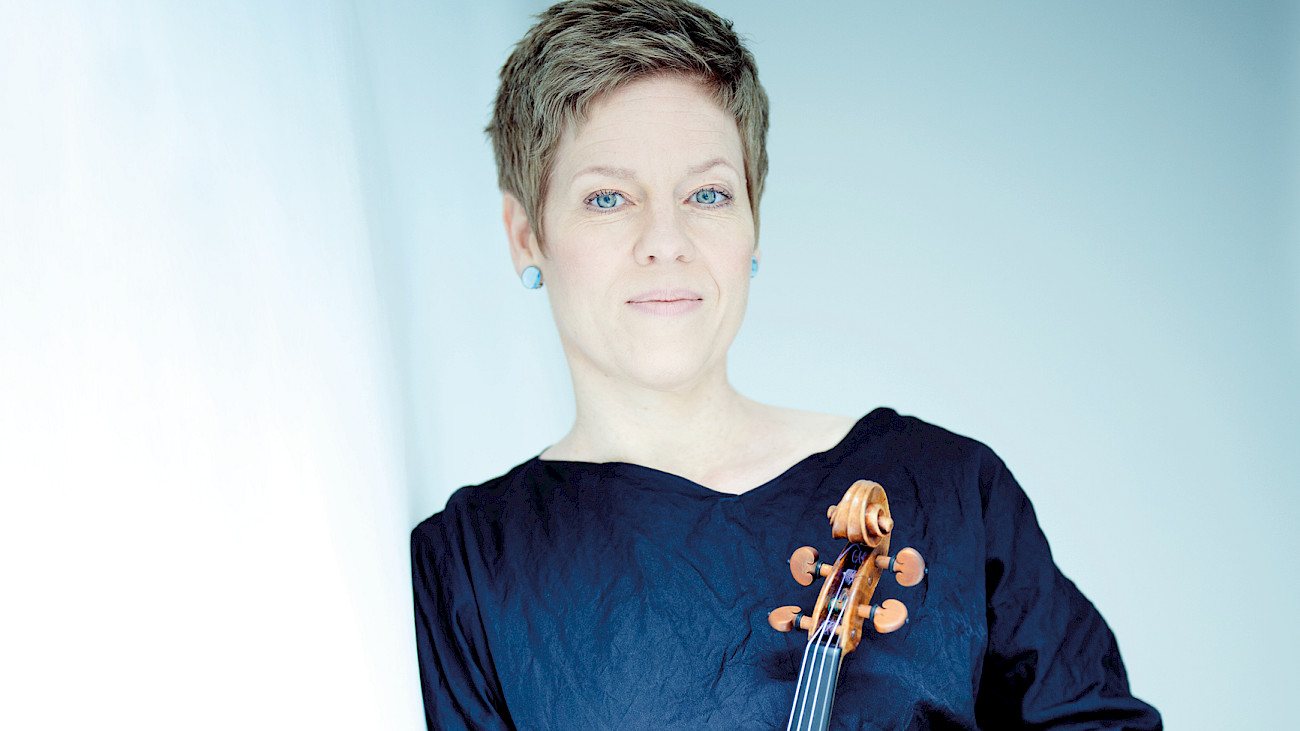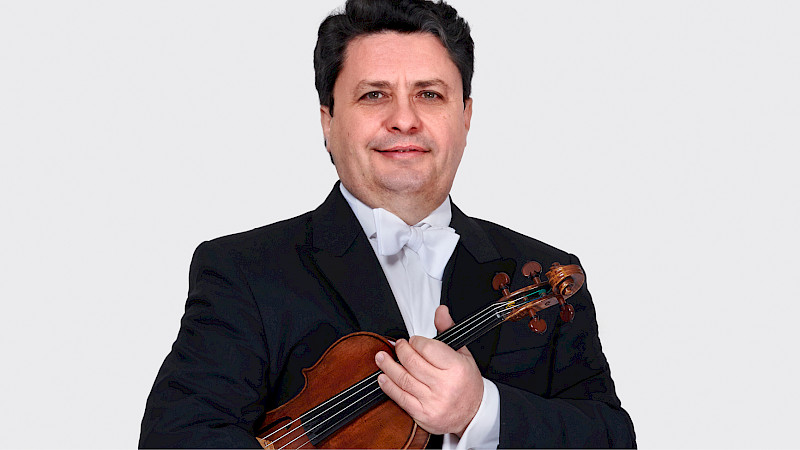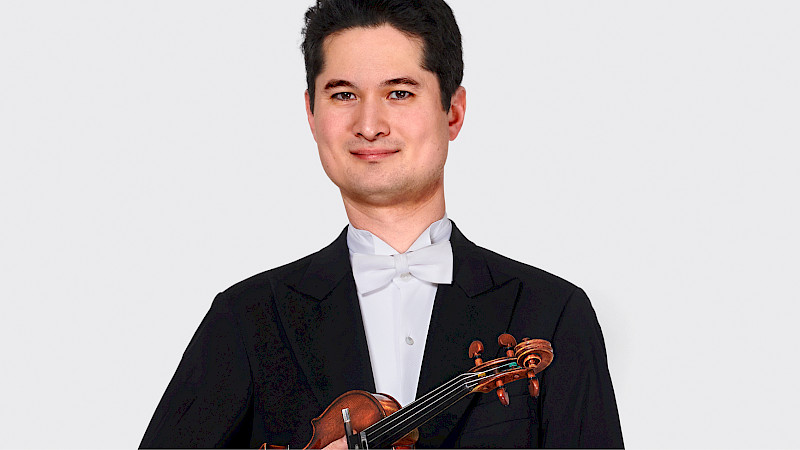
"This violin knows exactly what it wants"
In April, Isabelle Faust plays Mozart's Violin Concerto No. 5 on the "Sleeping Beauty" Stradivarius from 1704. What kind of instrument is that?
Isabelle Faust, how would you describe the character of the "Sleeping Beauty" Stradivarius?
It is a finely spun violin. It is relatively delicate, very manoeuvrable, very articulate - which is particularly suitable for Mozart. It has this bright, flying sound and is therefore particularly suitable for anything that needs a lot of light and airiness.
The instrument was given the name "Sleeping Beauty" because it slept for a long time - it remained unused for almost three hundred years. How did it survive this time unscathed?
The violin was actually stored in a cupboard in a small German castle for a very long time, where it was probably simply forgotten. But apparently the climatic conditions were favourable, at any rate it is in excellent condition. Perhaps it was even lucky that it had not been maltreated for so many years. Something can always happen, you hit the instrument with a bow, or you travel from the wettest to the driest place, which is not without its problems.
You have been playing this violin since 1996, has its sound changed since then?
In the beginning, it developed a lot - because although the long rest didn't harm it, it was still a little sleepy ... If you want a violin to resonate fully, you have to make it vibrate and challenge it. Looking back, I would say that it took me about five years to get to know it well enough to know what it needed. With such high-quality violins, which have their own characters and needs, it takes a while to empathise with them. And vice versa, she also had to get to know me, it's like an interaction.
You talk about your violin almost like a pet. If it were actually an animal - what kind of animal would it be?
Probably a cat. She's very headstrong and knows exactly what she wants. She has a strong character. And she is very supple.
"I always struggle a little when so much emphasis is placed on the instrument. When people say: Oh, you play a Stradivarius, then you're all set."
Keyword idiosyncratic: it is undoubtedly an honour to be allowed to play a Stradivarius. But couldn't it also be that such an instrument doesn't suit you at all?
Yes, of course! But this violin is actually very much my own. I chose it specifically - although it wasn't as if I had tried out dozens of Stradivaris at the time. A friend advised me to try it out and we sympathised with each other from the very beginning. As I said, it had fallen asleep, but there were individual notes on all four strings that shone like stars for me. Someone else might not have experienced it like that. But I had never heard such sounds before and they fascinated me so much that I knew it was worth fighting for this instrument.
What did fighting mean in this case?
Well, I didn't have the necessary millions in my account ... So I had to find a sponsor. That wasn't easy, but it worked. L-Bank bought the violin and I've been allowed to play it ever since.
Were you never afraid that the bank would take it away from you and lend it to someone else?
No, I'm incredibly lucky. There is no limit to the loan period; as long as the bank feels that the violin is in good hands with me, it doesn't seem to be a problem. That's hugely important, because you have to really get to grips with an instrument like this. If you have a deadline and you know that you have to start all over again afterwards, it can be dramatic.
Because you lose your voice, so to speak?
Yes, exactly. Of course, the lean playing that this violin demands was already inherent in me, but it certainly developed even further in this direction because of it. Who knows, maybe I would play differently today if I had been given a different instrument back then. It really is a partnership with a violin like that, you adapt and influence each other.
If we go back in your history: How many violins were important to you?
At the very beginning, I had a beautiful half violin from Klotz. I only vaguely remember its sound, but I was incredibly proud of it. However, it was soon sold again so that we could afford the next instrument: This was a Scarampella from my violin teacher at the time, in other words a not-so-old Italian violin. I played all the youth music competitions on it and also won my first international competitions. It was a solid, not particularly sophisticated instrument that gave me a solid foundation. Even at a level where you would gradually have to move towards really good Italians, it went through everything as a very down-to-earth and reliable accompanist. Today, in addition to the "Sleeping Beauty" Stradivarius, I also play a newly built baroque violin.
And how many bows do you use?
A lot more than violins! I love excellent bows and am always amazed when others don't give them any special significance. The difference in sound is enormous when you change the bow. I use a different bow depending on what I'm playing, who I'm playing with and the acoustics. With CD recordings, I may choose a different bow for each movement of a baroque sonata; one may be more lyrical, another may articulate well.
Do you already know which bow you will use to play Mozart's Violin Concerto No. 5 in Zurich?
No, as always, I will only decide that during rehearsals. Incidentally, I'm really looking forward to the concert: it will be conducted by Giovanni Antonini, with whom I once recorded all of Mozart's concertos with the ensemble Il Giardino Armonico. We recently toured Japan with them again - and it will be different again with the orchestra. He lures me into very special musical corners every time.
"Who knows, maybe I would play differently today if I had picked up a different instrument back then. It really is a partnership with a violin like this, you adapt and influence each other."
With Mozart, the orchestra will be small, but with your Stradivarius you also encounter large ensembles. How does that work?
It has a special timbre, an almost glassy, vanilla-like sound that also sets it apart from large symphony orchestras. Of course, I play with steel strings in modern orchestras, gut strings wouldn't work there. But that way it never really goes under. I always have other violins in my hands to try out, which may have more power, but they have a darker, rounder sound, so it's not always easier to assert yourself against an orchestra.
And how does the violin hold up when you play contemporary music?
Sometimes it reaches its limits. It depends on the day, whether it's in a good mood or not - but when you really dig in, it has to hold its breath a bit. Sometimes I almost feel sorry that I have to take her by the throat like that. But that's part of it.
That leaves the heretical question: how important is an outstanding violin? How many people in the audience can hear the difference?
We string players are all a little traumatised by the question of instruments; we always wonder whether we should keep looking. But the bottom line is how you play. If my violin is a bit huffy, hardly anyone but me will notice. If, on the other hand, you don't know exactly what you want to express musically, it has a much greater impact: That actually decides whether it will be a concert that takes people away or not. That's why I always struggle a bit when so much emphasis is placed on the instrument. When people say: Oh, you play a Stradivarius, then you're all set.
In other words: if you have nothing to offer musically, even a Stradivarius won't help you.
Exactly. I remember a course by Nathan Milstein that I was allowed to attend in Zurich when I was about 13 years old. He was already very old at the time and didn't have his violin with him. But sometimes he would pick up a student's violin and demonstrate something. These were by no means Stradivaris, and it really fascinated me that it always sounded like Nathan Milstein.
But you still sound most like Isabelle Faust when you have your Stradivarius in your hand?
Yes, because of course you can express yourself more expressively when you feel supported or even guided by the violin. When it shows you that there is another horizon: Only then can you really take off.
We use deepL.com for our translations into English.





